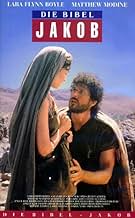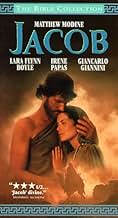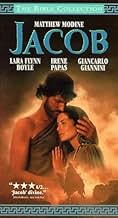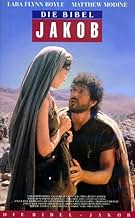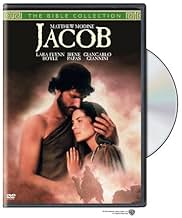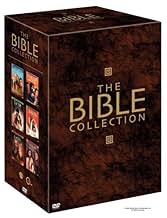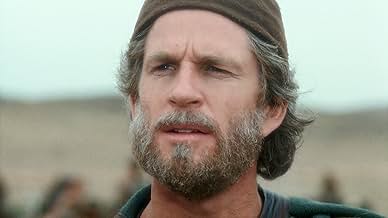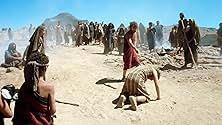Aggiungi una trama nella tua linguaIn the foreign land of Canaan lives Isaac, son of Abraham, with his clever, strong-willed wife Rebekah and his twin sons Esau and Jacob. The first-born, Esau, is a strong and fearless hunter... Leggi tuttoIn the foreign land of Canaan lives Isaac, son of Abraham, with his clever, strong-willed wife Rebekah and his twin sons Esau and Jacob. The first-born, Esau, is a strong and fearless hunter with a voracious appetite for sensual pleasures. Jacob is a shepherd, more tender and com... Leggi tuttoIn the foreign land of Canaan lives Isaac, son of Abraham, with his clever, strong-willed wife Rebekah and his twin sons Esau and Jacob. The first-born, Esau, is a strong and fearless hunter with a voracious appetite for sensual pleasures. Jacob is a shepherd, more tender and compassionate han Esau. Just as Esau is the pride of his father, so is Jacob the apple of his... Leggi tutto
- Regia
- Sceneggiatura
- Star
- Premi
- 1 candidatura in totale
- Be'or
- (as Christoph Ohrt)
- Judith
- (as Yvonne Scio')
- Gaham
- (as Padraig Casey)
Recensioni in evidenza
The time line is as follows: Abraham lived 175 years and was 100 when Issac was born. Isaac lived 185 years and was 60 when Yaakov and Esav were born. This would make Abraham 160 when his grandchildren were born and 15 when he died.
As for the "dowry," that was taken from him by Elifaz the son of Esav as he was sent to kill Yaakov. The problem Elifaz had was that he used to study with Yaakov and as such was looking for a way not to actually "kill" his uncle while at the same time listen to his father. The way around that was to take all of Yaakov's possessions and according to the Talmud, a destitute person is considered dead, thus he "honored" his father.
You were correct that the "accuracy" to the Torah was quite good. I would not go ahead and compare the Torah story of Yaakov to anything else you did as there can be NO comparison.
Abraham must have died somewhere around the time either just before or just after the twins (Jacob and Esau) were born. In the film, Isaac and Abraham actually die within the same year, or possibly Isaac dies first! Well, that is trivial but my point and my concern is that when a film is as accurate as this it can lead some to learn incorrectly if they assume everything is accurate.
The things I like about this may also seem trivial, but they are plentiful and continue throughout the film. When Jacob has to flee to Laban's village, it takes several days. There was an interesting thing they added to the film that actually may be a logical addition from the story that we are not told. When Jacob leaves for Laban's, the Bible does tell us that Isaac sends him to take a wife. We are not told about a dowry and this is a very interesting mystery. Why? Now only is this a very important custom, but we also know that Abraham and Isaac were very very wealthy. None of the films I have seen even begin to show how much so. When Abraham went on an urgent mission to save Lot (before Sodom was destroyed) he had over 300 men with him that were on his payroll. That many people can watch over HUGE herds but even if they only had 10 animals to watch over per man, this is 3000 head of various animals. Heck, even if he hired a man for EACH ANIMAL, he still has a herd of 300. That is not super rich but certainly not poor. There is no way that anyone would expect to take a wife without a dowry unless his family was very very poor! Yet we have no idea why Jacob arrives without a dowry.
The film postulates that he did have a dowry but that he lost it on the way. This occurs when Jacob sees a man tracking him and fears either his brother or an assassin on his brother's behalf (it is a brother in-law of Esau) and Jacob hurries up a hill with his donkey holding him back. The dowry is packed on the donkey and falls off the hill down to where the assassin is chasing, who after all was most interested in killing him to steal the dowry. This made a lot of sense because I can't figure out any other reason why Jacob would show up without a dowry, knowing his sole purpose was to take a wife and the only other factor was yes, the timing was more urgent because of the fight with Esau.
Another thing I appreciated was a scene soon after he loses the dowry. In the Bible, there is a dream Jacob has about the ladder (known as "Jacob's ladder", and it is symbolic for Christ as the bridge that joins Heaven and earth). The digital effects that were used to depict this though not especially fancy, I thought they were just right in that they were beautiful without being too fancy or "showy" the way so many effects people in modern film seem to over-do their scenes at times. This was a beautiful shimmering golden ladder that came down to the stone lined path that Jacob was following until he laid down to sleep that evening.
The rest of the film was done just as well in following the Bible closer than most screenplays manage, even with a topic as important as the Bible. All of the actors handled several complex situations just right. I don't think I could improve on the screenplay without making it far more complicated so obviously that is unfair of me to expect anything better. The pace even seemed roughly the same as in the Bible in that they glossed over sections we don't know as much about and expanded really only when the detail was available with the only exception as I indicated (the dowry).
The only other way for me to rate this film higher would be for them to somehow make it more interesting, but them that is hypocrisy for me to ask for authenticity and entertainment! The story is what it is. I am rating it an outright 8 as a film and a 10 for a Biblical adaptation. I feel that the production values (the lighting, balance, score etc. things that are normally ignored by most unless they are annoyed by it) were also just right. I just realized that I saw a pack of I think 6 Bible film adaptations and they were all really excellent. It contained all of the best adaptations together, except for "Jesus of Nazareth" (which I have on VHS and is worth buying on its own). The 6-pack includes the story of Saul and David (either 2 separate films by era or probably originally a mini-series), I think it does contain the classic film from the '50s, "The 10 Commandments" (some consider it the best Bible adaptation of all but I think several from this 6-pack are better) and if I find the site I will post comments again. It looks really worth owning.
I don't want to set anyone's expectations too high.. As I have said, this is not the most interesting story to some people but if you go in to it with that in mind I think you will be pleasantly surprised.
Biblical story narrated on The Genesis Book from the Holy Bible. This is the classy Biblic history with usual ingredients, dramas confrontation and romances. However, here lacks battles, epic events and spectacular settings. As it is a medium budget film, without pompa, shot simply on the usual location in Morocco .Well played by a very fine main and support cast. Matthew Modine is nice as as the good shepherd who God finally appoints as ruler of Israel and Father of Israelis. Lara Flynn Boyle is attractive as Rachel and Juliet Aubrey as her sister is charming . Remaining cast is excellent as Joss Ackland playing Isaac, Irene Papas as Rebekah, Giancarlo Giannini as Jacob's father-in-law, Christopher Ohrt as Morah, Yvonne Scio and brief appearance by a young Christopher Waltz.
It packs a sensitive and adequate musical score by Marco Frisina under supervision by the great Ennio Morricone. And colorful, evocative cinematography by Ennio Guarneri. The motion picture was professionally directed by Peter Hall. He was director of the Royal Shakespeare Company, as he took over the direction of the National Theatre from Sir Laurence Olivier. Peter Hall, Rebecca Hall's father, also directed some films as Never talk to strangers, The homecoming, La traviata, Perfect Friday, Work is a 4-letter word. Rating 6/10. Entertaining religious epic for the Bible lovers.
Good casting - well acted. I will be honest, I would have enjoyed the film better if Sean Bean played Jacob (but he did play Esau - the reason I watched the movie).
It's a rather slow story - but fine if you like Biblical Tales.
6/10
Lo sapevi?
- QuizThe scene of Jacob's dream where God speaks to him while releasing an enormous staircase to Heaven (better known as "Jacob's Ladder") was designed by the American visual effects company, Dream Quest Images.
- ConnessioniFollowed by Giuseppe (1995)
I più visti
Dettagli
- Data di uscita
- Paesi di origine
- Sito ufficiale
- Lingua
- Celebre anche come
- Jacob: A TNT Bible Story
- Luoghi delle riprese
- Aziende produttrici
- Vedi altri crediti dell’azienda su IMDbPro

